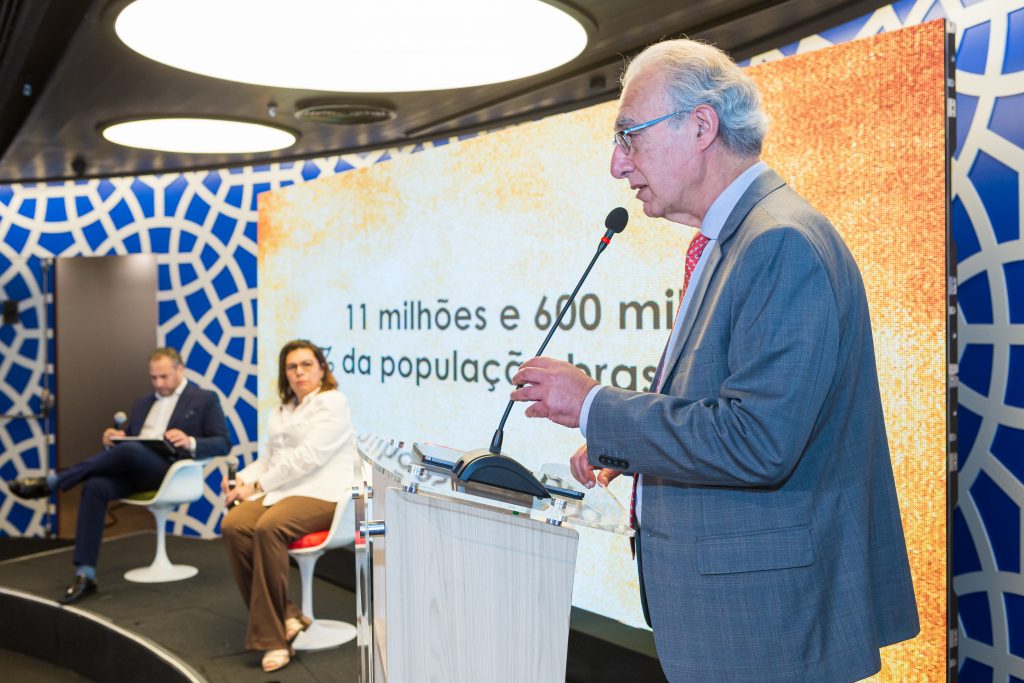São Paulo – During an online event on Wednesday (22) that marked its 68th year in existence, Arab Brazilian Chamber of Commerce (ABCC) president Rubens Hannun announced the creation of the Arab House. The event also saw the release of a survey of Arab immigrants in Brazil. The newly established House of Arabs is expected to play a key role in asserting the identity of the Arab-Brazilian community.

“We will need to provide access to the culture, the history and the traditions to grownups, young people and children in each and every corner of Brazil. That is why today we are launching the Arab House, which will start out in virtual fashion and then materialize in physical form over time,” said Hannun. According to him, the House will focus on culture as well as cuisine, economics, society, and identity issues.
The survey presented during the event showed that some of the Arab descendants – especially the younger ones – are drifting away from their roots. The idea is to have the Arab House counter that, Hannun explained. The initiative will be available online at first, so it can be available across Brazil and elsewhere in the world. “There will be a place for all things Arab in this House,” he said.

The survey on immigration conducted by Ibope Inteligência and H2R Pesquisas Avançadas demonstrated that Brazil is home to 11.6 million Arabs and Arab descendants. “This is the biggest population of Arab origin away from the Arab territories,” Hannun remarked. The ABCC’s Policy Council chairman Walid Yazigi noted that prior to the survey, numbers regarding the community used to be guesswork, to an extent. “That uncertainty prompted the Arab Brazilian Chamber of Commerce to take a scientific approach to doing this census,” he said.
Hannun spoke of the joy of having an immense and successful Arab community in Brazil, and pointed out that these people identify themselves as Brazilians as well as Arabs. ABCC secretary-general and CEO Tamer Mansour is a case in point. “I was born in Egypt. I arrived in Brazil over 19 years ago. I am part of this history, and I am proud of being an Arab Brazilian, as well as a Brazilian Arab,” he said.
Regarding the survey data, Hannun said doing collaborative work to the benefit of Brazil is a characteristic of the Arab community, and the ABCC itself is an example of that. He also mentioned other defining features of Arabs that the survey unearthed, such as entrepreneurship, productivity and leadership. “Arabs are genuine protagonists,” he said, adding that Arabs had their beginnings in Brazil as traveling salespeople, and now they are corporate leaders.

Hannun said the ABCC will embrace the purpose of connecting the Arab community to itself and its roots. Besides creating the Arab House, the organization is planning to release the results of its studies on Arab presence in Brazil in book form. The publication should include a reflection from Walid Yazigi and it will be made available in Brazilian Portuguese, English, and Arabic.
The ABCC Policy Board chairman reminded viewers of the history of Arab immigration, going back to Brazilian emperor Dom Pedro II’s tours of Arab countries, which encouraged immigration to Brazil. He also mentioned that people flocked in from Syria and Lebanon seeking better living conditions, and discussed Arab tours made by Brazilian presidents.

Featured in previously filmed footage, Arab League secretary-general Ahmed Aboul Gheit said Brazilian-Arab relations are outstandingly solid. He said Brazil has repeatedly supported Arab causes, particularly the Palestinian one, through political positions underpinned by the observance of international law. “We hope that this will continue to be the case,” he said.
The dean of the Council of Arab Ambassadors in Brazil and ambassador of Palestine, Ibrahim Alzeben, joined the event from Brasília. He congratulated the ABCC on its 68th anniversary and the immigration survey initiative. He said work is in order to enhance Brazilian-Arab exchange. According to Alzeben, all Arab countries from Mauritania to the Gulf have a lot to offer Brazil, and this goes both ways.
The event also featured H2R Pesquisas Avançadas director Alessandra Frisso and Ibope Inteligência CEO Márcia Cavallari Nunes, who discussed survey data. Testimonial footage was shown of Arab descendants who have risen to prominence in their professions.
For more on the survey and the virtual event please check out:
Arabs, descendants are 6% of Brazil’s population: survey
Ten pct of Brazil’s business leaders are Arab or descendants
Arab descendants: 41% are third-generation immigrants
Pride in Arab roots ties together generations
You can watch the full webinar here:
Translated by Gabriel Pomerancblum




